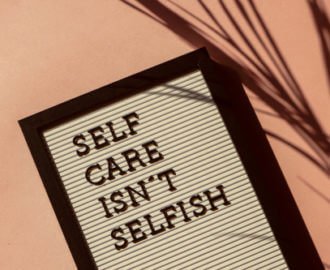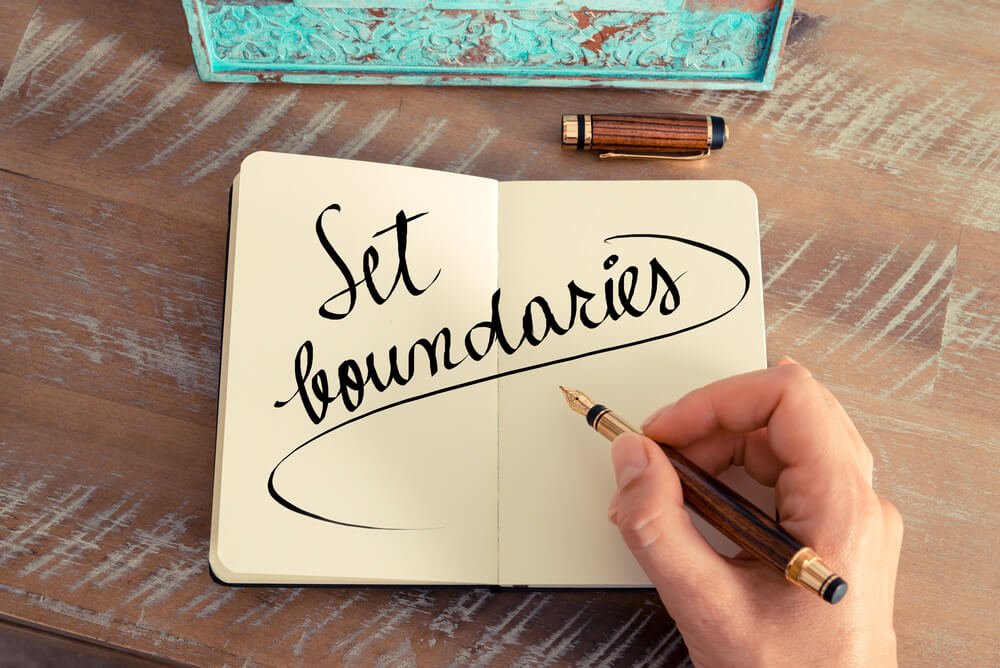Set Boundaries for Self-Care – 10 No-BS Ways
Learning to trust yourself and be guided by your intuition is crucial in setting healthy boundaries. Healthy boundaries include learning to show up for yourself with self-compassion, acceptance, respect, and loving-kindness.
This is especially pertinent during stressful times like the pandemic we are all living through. We are all experiencing elevated levels of conscious, and unconscious stress. In today’s society, unfortunately, we are not overtly taught the significance and skill of establishing and sustaining these boundaries according to psychologist and coach Dana Gionta, Ph.D. We pick up pointers here and there through the process of socialization. However, for many of us, boundary-building is a relatively new concept and a challenging one. Having healthy boundaries means “knowing and understanding what your limits are,” Dr. Gionta said.
Here are 10 ways to set no-BS boundaries for better self-care.
Set Boundaries for Self Care: Be Aware
In order to truly practice healthy boundaries, understanding what boundaries are is key. There are a few broad categories of boundaries: verbal, psychological, emotional, and physical. It is also important to be aware of ethical, spiritual, and moral boundaries.
Take some time to consider this list and perhaps write down examples of each and how they present in your life. Once you have your list, roughly rank or categorize the types of boundaries that feel easier vs. harder for you to maintain whilst being true to yourself. Now write down a recent example of a boundary you respected and maintained, how did it make you feel? Also, write down an example of a boundary that got crossed, how did that feel? You’ll begin to notice how maintenance of boundaries leads to a strengthening in your mental health.
How do you know when a boundary has been crossed?
We all have different “tells” when it comes to awareness. For some it may be an intuitive gut feeling, for others, it may be more of an intellectual exercised perception. Practicing tuning into one’s feelings and beginning to recognize patterns is very beneficial in creating healthy boundaries.
Set Boundaries for Self Care: Be Aware of your Areas of Strength and Areas in need of Strengthening
Once we know the types of boundaries which we consider to be areas of ease and strength, it makes it easier to focus on the areas in need of more attention and awareness. Realizing we are creatures of habit but are also capable of change is key. Interrupting and rewiring old habituated patterns empowers us to assert our boundaries more naturally and confidently.
Ultimately we are responsible for our own self-growth.
Hypnotherapy and integrative life coaching are powerful modalities that are considered very helpful in promoting new neural pathways as a result of our neuroplasticity, and therefore a deeper understanding of ourselves. Curious? Transform and empower yourself by booking an introductory hypnotherapy session with Carla Chalah of Hemisphere Hypnotherapy today.
Know Thyself and Set Boundaries for Self Care
Being honest and introspective with ourselves can be hard. Especially since according to Abigail Brenner M.D., as social beings, we define who we are, in part, by and through the relationships we have. I would add, that our recognition and confident execution of healthy boundaries serves as a barometer for the ever-evolving relationship we have with ourselves.
As a naïve 20-something-year-old trying to find her place in the world, a wise friend once told me that I would never allow others to treat me worse than I would allow myself to treat myself.
Going inward and becoming aware of the balance between positive and negative self-talk is a sure way to gauge personal boundaries and to get to know yourself better, as well as implement beneficial changes and self-care. This might seem “simple” but it is a sure no-BS way to set better boundaries for self-care.

Set Boundaries for Self Care: Open the lens
The second agreement in “The Four Agreements,” by Don Miguel Ruiz, (one of my favorite spiritual awakening books) states, “Don’t Take Anything Personally.” This is certainly easier said than done.
Perception is the lens through which we are able to generate our reality and as such, ourselves, our egos, and our identities. Therefore it becomes almost “impossible” not to take things personally because we experience everything through subjective, personal experience. We can only experience life as ourselves, so everything that happens, by necessity, happens to us and through our perception of our environment including relationships, actions, behaviors, etc.
As the famous Wayne Dyer quote goes, “If you change the way you look at things, the things you look at begin to change.” Essentially, by accessing our inner world and becoming familiar and comfortable with our own beliefs, emotions, feelings, ideas, and boundaries we are able to practice better, more authentic self-care and a more fulfilling relationship with ourselves and the world around us. We also become aware of areas of solidity and those areas where flexibility might feel better.
Set boundaries for self-care.
Set Boundaries for Self Care: Self-Care is not Selfish
People who are selfish typically come from a place of fear. Self-care is manifested as an act of love. Self-care takes time. And since time is the most precious commodity we have to give ourselves and/or others, it is sometimes misinterpreted as being selfish. Self-care takes time away from other things like work, family, and friends. We all know that we need to secure our own oxygen mask before assisting others on an airplane in the case of an emergency, however, many of us (especially moms), often harbor feelings of guilt and fear of how our self-care might be perceived by others as being selfish, or worse, by learning through experience that others respond negatively to us taking time for ourselves. If the latter is the case, this can become a detrimental, negative habituated pattern or practiced lack of personal boundaries. Set boundaries for self-care.

Set Boundaries for Self Care: Stop guilt in its tracks
Self-care shame is a thing.
Since saying yes to ourselves often means saying no to others and other things, sometimes setting these boundaries can feel challenging. In many cases when we do turn a “yes” into a “no” in the name of self-care, we can be left feeling guilty.
Psychotherapist, Ashley Elder, told Psych Central, “We are surrounded by overt and covert messages that encourage us to minimize our own needs and feel guilty when we engage in self-care. Think how many times a day you see some kind of reference to a woman ‘indulging,’ ‘splurging,’ or ‘sinning’ because she meets a basic need like eating food she enjoys or taking time to relax.”
Elder recommends looking at care as a finite resource like money in the bank. “You can’t give more than you have without bankrupting yourself. You also can’t invest your money in making more money if you give it all away. Having the resources to share with others depends on the conservation and renewal of your own supply.”
Reframing what self-care means and the importance of it can be hugely beneficial in stopping guilt in its tracks. As Rachel W. Cole, a life coach and retreat leader, said, “self-care is other care.”
In other words, practicing self-care helps us help others more effectively. Practicing healthy boundaries and promoting self-care, in fact, leads to taking better care of others also. Healthy boundaries make for better self-esteem and self-image. Self-care should never be negotiable; it is a necessary part of everyday life. The firmer and more assertive we become in realizing we are deserving of healthy boundaries and self-care; the more feelings of guilt begin to dissipate and fade.
Make Self-Care a Priority
The way I see it, healthy boundaries and some self-care each day keeps fatigue and resentment at bay. Set boundaries for self-care. As a woman and mom, there are few things worse than taking care of others resentfully, or perhaps even worse, being the recipient of “resentful giving.” Giving out of guilt is not the same as giving out of love. Margaret Tartakovsky, the author of Psych Central’s Weightless blog, states, “Self-care is everything from getting enough sleep to being honest with your spouse. It’s giving yourself what you need and asking what you need from others.” Go take that Yoga class instead of making an excuse.
Take Responsibility and Learn to Recognize the Red Flags
We are all responsible for the establishment and maintenance of our own boundaries. Knowing the negotiable from the non-negotiable ones is fundamental in delineating how we feel about ourselves and the relationships we have with others. Strong, healthy boundaries are reflective of higher self-worth. It is human nature from a young age to test limits and to begin conceptualizing where our boundaries with ourselves and others lie. However, when someone repeatedly shows you that they don’t respect your boundaries, believe them, and take action. By justifying others’ bad behavior which oversteps your own personal boundaries, not only are you not practicing self-care, but you are also sending a signal to yourself subconsciously that you are not worthy of priority, attention, and love; as well as enabling the perpetrator’s behavior and making it “ok.”
When we begin to get that gut feeling that we are justifying others’ bad behavior and allowing disrespect of our boundaries, it is a surefire red flag.
Perpetua Neo, a psychologist and expert in toxic relationships who created the Detox Your Heart program states, “The mind is the most skilled Photoshopper — it can rationalize anything and paint any picture of anyone, depending on our initial perspective. There is a psychological phenomenon known as the ‘confirmation bias,’ where we are inclined to discard all evidence that does not align with our views and only keep those that do. And with a potentially toxic person, they have worked to create a false positive impression to worm their way into your heart.”

Stop Trying to Fix People
Our desire to “fix” people, oftentimes, has more to do with our need to validate ourselves than with helping the other person.
Author, Mark Manson writes, “Victims and savers both get kind of an emotional high off one another. It’s like an addiction they fulfill in one another, and when presented with emotionally healthy people to date, they usually feel bored or a lack of “chemistry. They’ll pass on healthy, secure individuals because the secure partner’s solid boundaries will not excite the loose emotional boundaries of the needy person.
From an Attachment Theory perspective, victims tend to be anxious-attachment types, and savers tend to be avoidant-attachment types. Or as [he] likes to call them: crazy people and assholes. Both often push away secure-attachment types.”
By placing emphasis on our own healthy boundaries, we deter disrespect of our boundaries by ourselves or others. People do not change unless they are motivated to do so. By practicing self-care through healthier boundaries, we are fostering a healthier relationship with ourselves and ultimately better emotional stability and health. Set boundaries for self-care.
Self-Actualize
We are all responsible for our own self-actualization. There is a reason self-actualization sits at the top of Maslow’s hierarchy of needs. Motivation increases as needs are met, thus as we demonstrate better self-care, by affirming solid, healthy boundaries, we begin to experience more fulfillment, happiness, and less “drama” in life.
Final Word on no-bs boundaries for Self-Care
In closing, learn to recognize that self-care is not selfish, it is essential in building self-esteem, self-confidence, and self-worth. These characteristics are invaluable during times of stress like the COVID-19 pandemic and constructive in living a life worth celebrating!
Start supporting your self-growth today with no-bs boundaries for better self-care. Your future self will thank you.


